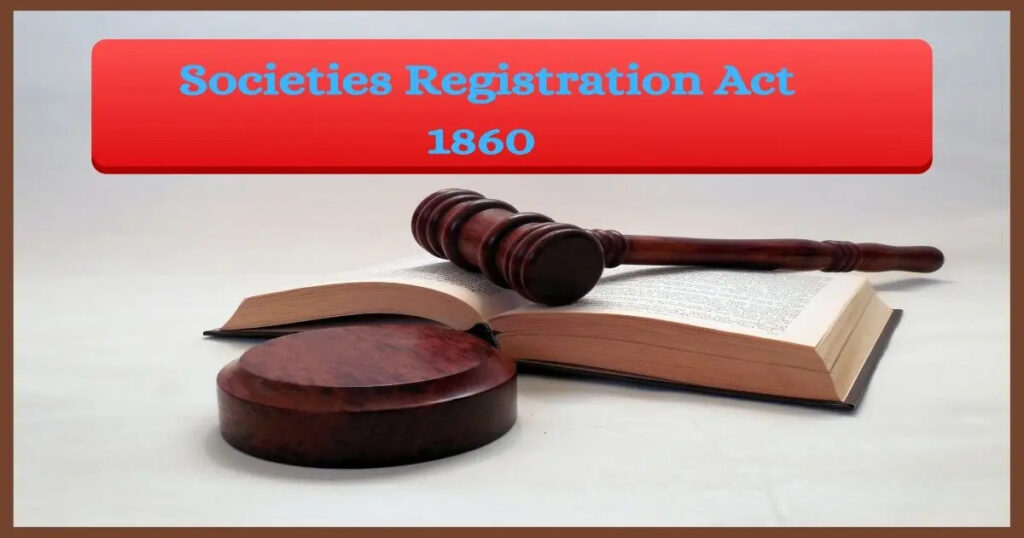Get the Benefits of the Societies Registration Act – Register Now

The Society Registration Act is a law passed in India that governs the registration and operation of societies, associations, and other non-governmental organisations. This act has been in effect for over 150 years and continues to be an important piece of legislation for regulating various charitable organisations, clubs, sports bodies, cooperative societies and other such entities.In this blog post, we will explore the significance of the Societies Registration, the purposes for which it is used, and its implications for Indian society.
What is the Societies Registration Act 1860
The Society Registration Act of 1860 is an important part of Indian law and is integral to forming societies, clubs, and other organisations. It was enacted in British India in 1860 and remains applicable in India today.
The main goal of the Act was to provide legal recognition to voluntary associations so they may function as a corporate body with their own rules and regulations.
The Societies Registration Act 1860 is one of the most important pieces of legislation in India, as it provides the legal framework for registering non-profit organisations. Under this act, any society or association with at least seven members can apply to the Registrar of Companies(ROC) for registration under the SRA.
The ROC will then issue a certificate of incorporation if all requirements have been met, granting the housing society or association formal legal recognition. Once registered, these organisations are required to keep accurate financial records and submit annual returns to the ROC.
The main purpose of this act is to protect members of these organisations by ensuring that their rights are respected and defended. It also seeks to promote transparency by requiring the regular filing of annual returns with details about the organisation’s activities, finances and membership numbers.
Furthermore, it sets forth rules governing how societies must be managed regarding elections and other internal matters.
Society Registration Purposes

(Source: Spade)Image-Caption: The purpose of Society registration is vast.
The following goals are met with a Society’s registration.
- To unite individuals to pursue common goals or interests related to literature, science or charity.
- To teach useful knowledge.
- To provide financial assistance to those in need.
- To raise money for the military and gather supplies for orphans.
- To act as a foundation for public museums, art galleries, and other cultural institutions.
- Donation of a charitable gift.
- Promotion, instruction, or dissemination of knowledge that is valuable.
- Political education distribution.
Societies are also an effective way of pooling resources among members to provide support services such as healthcare facilities and conducting fundraising activities that benefit the wider society.
Significance of the Society Registration Act

(Source: Square Yards)Image-Caption: Knowing the significance of the society act 1860 is important.
The Society Registration Act defines a society as any voluntary association formed for literary, scientific, or charitable purposes that have at least seven members. It outlines the process for registering such societies with the Registrar of Societies. Also, it stipulates various rules for their functioning, including how to transfer funds from one account to another, how meetings should be conducted, how decisions are made, etc.
The significance of the Society Registration Act lies in its provision for legal recognition to societies, which enables them to enter into contracts, acquire property, sue or be sued in their name, etc.
This allows these organisations to operate more effectively by giving them some degree of autonomy from their members and protecting their interests from external interference.
Another key aspect of this act is its provision for registration under certain specific conditions, such as when an organisation’s aims are not contrary to public policy or morality. This helps protect society members from potential disputes or frauds related to these organisations.
Furthermore, it provides guidelines on resolving member disputes without involving courts or other external parties.
Registering a Society in India

(Source: Corpbiz)Image-Caption: Registration under the society act in India since 1860.
In India, societies must register under the Society Registration Act of 1860. This act applies to all non-profit organisations, including charities, clubs, and voluntary associations. The purpose of the registration is to identify and record the members of a society and ensure that they comply with legal requirements and regulations.
The process for registering a society in India begins with–
- You must first learn the prerequisites for society registration in the state where the society’s registered office will be situated before you can register a society.
- The parties seeking to establish a society must then choose an appropriate name, the society’s goals, and its registered address.
- An attorney can draught the Society’s Memorandum of Association once a choice has been reached.
- A Notary Public shall witness the signatures of all society members on the MOA after it has been constituted.
- Also, the Rules and Regulations of the Society must be signed by a minimum of three governing board members.
- When the paperwork as mentioned above is completed and signed, it may be sent, together with other required paperwork, to the Registrar of Societies or another state-level agency in charge of society registration.
- The Registrar will review the application for society registration and either approve it or, if further information is required, request it.
- The Society’s MOA and Rules & Regulations certified copies provide prima-facie proof of its registration at the time of registration.
- The application is authorised, and the society will be registered if the local bodies are happy with the Society Registration paperwork, rules, and regulations.
Registering a society in India requires patience, but it’s worth it given all the other advantages that come along with it, such as legal recognition from government authorities and access to various benefits that enable them to carry out their operations more easily & efficiently according to legal guidelines laid down by Indian laws & regulations.
Memorandum of Association for Society Registration

(Source: Constitutional Counsels)Image-Caption: Rules and Regulations of society registration act 1860.
Forming a Society requires the signature of its founding members on two documents: the Memorandum and the Rules & Regulations. In addition, the details of the founding members, like their names, addresses, and designations, must be provided along with the name and objectives of the Society.
Both these documents must receive a witness from an authorised official, such as Notary Public, Gazetted Officer, Advocate, Chartered Accountant, Oath Commissioner or Magistrate first-class. These officials are to affix their official stamps with their corresponding addresses enclosed. To register a Society, approximately ₹5000 is needed for registration fees.
The Entity That Is Eligible For Society Registration

(Source: Digiqore) Image-Caption: Entities that are eligible for the cooperative society registration act.
The Society Registration Act 1860 is an important legislation in India that governs the registration of societies and other organisations. Under this act, certain entities are eligible for society registration.
These entities include
- Companies
- Trusts
- Partnership Firms
- Universities
- Educational institutions
- A non-resident of India or Foreigners
- Co-operative societies
- Any other association of individuals formed with a common objective.
The registering authority under this act is usually a Registrar or Deputy Registrar appointed by the state government concerned. All registration applications shall be made to this authority, after which they can make necessary enquiries into the proposed society’s eligibility criteria and financial position before granting the certificate of registration.
It is important to note that for an entity to be eligible for registration under this act, it must not be engaged in activities prohibited by law or activities prejudicial to the public interest or involving purposes opposed to morality and good conduct.
Furthermore, no society shall be registered if it has been formed solely with political objectives, such as overthrowing any government established by law or advocating violence against any person or group of persons on the grounds of religion, race or caste.
Once an entity has fulfilled all requirements about eligibility under this Act and has been successfully registered with a Certificate issued by the Registrar, it will be recognised as a legal entity capable of enjoying privileges conferred upon them through various laws applicable in their respective states and union territories in India.
Documents Required for Society Registration
Before the society Registrar accepts your application and finds your society register-worthy, you must compile several documents.
You need to have the following items ready before you even register
- A cover letter requesting society registration that has been signed by every founding or establishing member.
- The society registration meeting minutes, as well as a few crucial papers.
- A replica of the Memorandum of Agreement that has been signed.
- Address a NOC or No Objection Certificate provided by the office landlord, as well as evidence of the society’s registered office.
- A replica of the Rules & Regulations paperwork that all of the founding members have properly signed.
- A declaration of the relationship between the society’s members or subscribers made in an affidavit that the president and secretary of the organisation have sworn.
The society member must supply the following papers for society registration.
- With the application, please include the PAN cards of all the members of the proposed society.
- The Memorandum of Association lists the organisation’s activities and goals as well as the members’ complete addresses and the address of the registered society.
- The members’ residence documentation includes a bank statement, utility bill, driver’s licence, Aadhar card, or passport.
- The Rules & Regulations document contains the guidelines that the society will be governed by concerning day-to-day operations. The Chairman, President, Vice President, and Secretary of the Society will sign this paper.
- The cover letter should include the society’s goals and objectives, as stated above.
- A statement from the society’s president stating that they are qualified and eager to fill the position.
Indian legislation, known as the Societies Registration Act, regulates the creation and operation of societies, associations, and other non-governmental organisations. In this blog post, we have examined the different advantages that society may get by signing up with the government and the procedures required to do so.
The last thing we have done is provide you with a list of tools that can assist you in finishing the registration process.
In India, societies are crucial for the efficient operation of business. Although registration is necessary, it is undoubtedly worthwhile because of all the advantages that come with it, including access to various perks that make it simpler for society to conduct its activities legally and legal recognition from government officials.
Important Indian law, the Society Registration Act of 1860, allows for the registration of certain entities as societies. They include businesses, trusts, partnership firms, colleges, universities, non-resident Indians, foreigners, cooperative organisations, and any other group of people who have come together to pursue a shared goal.
NoBrokerHood is a platform simplifying registering a society under the Society Registration Act 1860. It provides streamlined and convenient services to entrepreneurs and business owners looking to register a society in India.
As such, NoBrokerHood’s comprehensive services make it an ideal solution for entrepreneurs looking for an efficient and hassle-free way to register a society under the Society Registration Act 1860.
FAQ’s
The main objective of this act is to provide a legal framework for the registration and regulation of societies in India. It enables them to acquire property, sue or be sued in their name and operate as institutions with distinct identities from their members. This will help them carry out activities such as social welfare projects, charitable donations, research initiatives etc., which are beneficial to society.
Once registered under this act, a society is deemed to have attained the legal status and acquires perpetual succession, i.e., it continues its existence even when any particular person ceases to remain its member, provided at least five members are remaining in it at all times who have not retired from office due to death or resignation or otherwise removed from office according to its memorandum & articles of association.
Further, it shall be able to access funds through bank accounts opened in its name and undertake activities approved by RoS without any restrictions imposed by government bodies on individuals holding similar offices in unregistered organisations like trusts etc.
Yes, non-compliance with provisions laid down in Society Registration Act 1860 may lead you into trouble due to the imposition of fines or imprisonment of up to six months or both depending upon the gravity & nature violation committed by you.
The time taken for your society’s registration process depends on how quickly you submit all necessary documents and how efficiently the RoS processes them—generally speaking. However, it may take anywhere from two weeks to six months.
Registered societies have several rights granted under them being recognised as legal entities according to this act. They can acquire property in their name, sue or be sued in their name, operate independently from their members, enter into contracts, open bank accounts etc., basically enjoy all those rights which any other entity would have if registered legally in India.